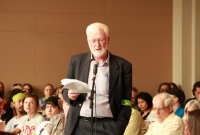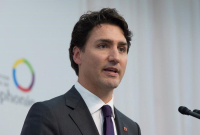Support strong Canadian climate journalism for 2025
A veteran energy industry executive, Marc Eliesen, has a simple message for the board members of Canada's national pipeline regulator: He wants all of these members of the National Energy Board (NEB) to resign.
“The Board has lost touch with what it means to protect the public interest,” former B.C. Hydro CEO Marc Eliesen wrote in remarks presented on Wednesday to a federal panel reviewing the "modernization" of the regulator. Eliesen provided a copy of his remarks to National Observer.
Eliesen has four decades of experience as a chief executive at provincial energy corporations, as CEO of B.C. Hydro and Ontario Hydro and as chair of Manitoba Hydro and CEO of the Manitoba Energy Authority. He also served as deputy minister of energy in Ontario and Manitoba, deputy minister of energy and mines in Manitoba and was a board member for Calgary-based energy company Suncor.
Eliesen, who has become one of the NEB's most vocal critics in recent years, was scheduled to deliver his comments in Vancouver on Wednesday to a panel appointed by Natural Resources Minister Jim Carr to report on how to modernize the National Energy Board.

But that alone won't fix the board's problems, Eliesen told National Observer.
“It’s not about modernization. Right from the start, this has been all about public trust. The National Energy Board has lost the public’s trust,” Eliesen said in an interview on Tuesday. “No amount of tinkering is going to change that.”
At the root of the problem, he said, is what he called the “cozy relationship” between energy companies and the NEB's staff. The 20 members of the current board “disproportionately represent the energy interests of Alberta,” he wrote in his remarks to be delivered on Wednesday. Many members appointed during the last months of Stephen Harper's government are closely tied to oil and gas companies, he noted.
He also pointed to a secret meeting held last year between TransCanada consultant Jean Charest and members of the panel reviewing the company's Energy East project. After National Observer reported on the meeting, all three members of the Energy East panel and NEB chair Peter Watson recused themselves from the file, which has since been restarted from scratch.
In another incident, the NEB removed paragraphs from the public version of a report on pipeline safety at Enbridge, at the company's request. The NEB later told National Observer that the report had been based in part on secret environmental reports produced by Enbridge, but said that it couldn't release copies of the reports because NEB staff had reviewed them at Enbridge's offices and hadn't made copies. “That's inexcusable,” Eliesen told National Observer.
“A regulator is not a partner of industry. A regulator must be arms-length and independent from industry,” he wrote. In his view, there is no solution but for all of the current members to resign. They should be replaced by new members with a "broad range of experience and expertise that fully represent the public interest of Canadians," Eliesen wrote.
He is also recommending that the NEB move back to Ottawa, where it was based until Brian Mulroney's government moved its offices to Calgary in 1991. That has created what he called a “revolving door between the NEB and industry,” where regulators end up seeing their priorities and those of the industry they are to regulate as one and the same.
The federal department responsible for the NEB, Natural Resources Canada, declined to comment on Eliesen’s recommendations, but said in a statement that the government “welcomes all suggestions to modernize the NEB."
NEB a "captured regulator"
Eliesen was an expert intervenor during the NEB's review of Kinder Morgan's Trans Mountain expansion project in 2014, but pulled out before testifying, instead writing in a scathing letter to the board that the process was “deceptive and misleading.”
In the letter, he wrote that he believed the process was rigged in favour of Kinder Morgan, and that the board members reviewing the project had systematically ignored or rejected contrary opinions.
That was an opinion endorsed by many First Nations, environmental organizations and West Coast municipalities. “Many, many voices were shut out of the process,” Vancouver mayor Gregor Robertson told the board last summer. Twenty other municipalities and 17 First Nations oppose the pipeline expansion.
According to Kinder Morgan, if the expansion goes ahead, a worst-case accident at the company's Burnaby terminal could spill 16 million litres of oil, which, Vancouver estimates, could kill as many as 100,000 birds and wipe out seals, salmon and killer whales. But none of that was properly considered by the panel reviewing the project, he said.
“The Board’s behaviour during the Trans Mountain review not only exposed the process as a farce, it exposed the Board as a captured regulator,” Eliesen wrote in his remarks delivered on Wednesday, meaning that the board is controlled by the industry interests it is supposed to regulate.
In 2016, Prime Minister Justin Trudeau appointed a separate panel to review the Trans Mountain project.
In a report to the federal government last November, the panel recommended further study on the project. Trudeau announced a few weeks later that the pipeline would go ahead, despite saying during the campaign that the project would be subject to a complete review. “It appears that they’ve reneged on this promise, just like they have reneged on a number of other promises,” Eliesen said.
"Old school approach to a new school reality"
Both the Kinder Morgan and Energy East reviews should have been suspended while the government completed its larger modernization review of the NEB, he said.
Eliesen is also arguing that some of the current responsibilities of the NEB be shifted to other government departments. That should include the job of assessing the environmental impact and safety of pipeline projects, which he argued should be returned to Environment Canada. The department was responsible for environmental assessment until legislative changes in 2012 shifted that job entirely to the NEB.
That's a huge problem, Eliesen argues: the board is too closely tied to industry to offer a neutral assessment of the environmental impact of pipeline projects, and members aren't equipped to evaluate the often-complex science involved. The NEB's current pipeline review process, for example, doesn't look at downstream emissions – that is, greenhouse gases produced when the oil is eventually used. That is a “glaring old school approach to a new school reality,” Eliesen wrote, and evidence that the board is out of touch with current climate science.
The modernization panel's public hearings are scheduled to continue until the spring, ending in Montreal on March 29.
The NEB is also now looking for a new permanent board member to replace Ron Wallace, who retired in 2016. The job was officially posted in late January, and applications are being accepted until the end of the day on Wednesday. The board currently has eight permanent members, each appointed for a seven year term.
Editor's note: This story was updated at 1:45 p.m. on Feb. 8, 2017 to add a comment from Natural Resources Canada.






Comments
It doesn't take an energy executive to see the NEB for what it is.
The "modernization tour" is more window dressing.
I said it a month ago
https://www.nationalobserver.com/2017/01/12/news/neb-assigns-recused-en…
I said it two months ago
https://www.nationalobserver.com/2016/11/30/news/scientists-dont-know-w…
I said it three times, three months ago
https://www.nationalobserver.com/2016/11/23/news/energy-east-opponents-…
https://www.nationalobserver.com/2016/11/22/news/pipeline-regulators-ch…
https://www.nationalobserver.com/2016/10/31/opinion/quebecs-jean-chares…
I said it four times, four months ago
https://www.nationalobserver.com/2016/10/24/news/two-members-regulator-…
https://www.nationalobserver.com/2016/10/21/news/how-texas-multinationa…
https://www.nationalobserver.com/2016/10/21/news/minister-carr-says-cha…
https://www.nationalobserver.com/2016/09/09/news/heres-what-people-are-…
I said it twice, five months ago
https://www.nationalobserver.com/2016/09/08/news/energy-east-pipeline-p…
https://www.nationalobserver.com/2016/08/29/analysis/what-charest-affai…
I said it six months ago
https://www.nationalobserver.com/2016/08/12/news/neb-considers-probing-…
And I'll keep saying it as long as there is a tongue in my mouth, and the NEB is a captured regulator. Does that mean pretty much the rest of my life, or are there really going to be changes?
Pretty much the rest of my life.
Bravo for speaking out and insiders exposing more and more of this noxious cesspool. I have to agree with Public Interest that it's all lies and run by industry. Incidentally, what happened after the photos of the Husky spill on Sask showed the leak had been ongoing for weeks or months? Seems that the NEB already settled on the story they liked and took no action. Maybe a spill into the Bow or Elbow rivers would elicit a different response, or perhaps a "fracking incident" that damages the mantle so that oil spewing into Calgary can't be stopped, as has happened elsewhere in the province. How long before we are getting hundreds of earthquakes like some states? If fracking and pipelines are so safe, they should be permitted in cities. No more NIMBY excuses, it should be in your neighbourhoods, where your kids play, and where your vegetables grow - especially those working in and demanding expansion of the industry.
Treetop, excellent comment; years ago a friend commented to the media that Ontario should bury it's Nuclear waste under Queens Park when Ontario Hydro was planning on building 4 Nuclear Reactors on Nipigon Bay on Lake Superiors most northern coast. I Motion that a Fracking Operation start on the grounds of Alberta's Legislature. Better yet Fracking rigs parked in the backyards of Alberta's Fox Theatre disguised as the AEB. I want to thank Public Interest also for his energy, compassion and time dedicated to exposing the falsehoods promoted by our alleged protectors, the, AEB, NEB and TSB. Diana Daunheimer has helped expose the disgrace the Industry Funded and Self Regulated AEB, Alberta Energy Board is in her comments. With that knowledge shared, i suspect the OEB, Ontario's Energy Board is the same sham.
Thanks Gerald. Fracking the Stampede Grounds and Prince's Island would certainly get folks talking. I would include the AER on your list of corrupt, bloody disgraces. That the Supreme Court wasted a year to come up with that verdict (Jessica Ernst vs the AER) sickens me. Notley talked very tough about the AER and making major changes to protect the environment and species in fire trouble. Days after she became top banana she announced the AER is great just as it is and cancelled even the promised review. Her first stop after winning was the Petroleum Club in Calgary to announce "Business As Usual". Sadly that is the one thing she meant. There isn't one agency protecting the environment or any living species from these monsters. Much is said about how corporations destroy 3rd world countries and leave barren, scorched earth behind while profits disappear, taxes are not paid, corrupt politicians fill their coffers and residents die from the poison. Look at pictures of these operations in BC and Alberta, what once was thriving boreal forest looks like the surface of the moon with lakes of poisoned water that will never be restored. They not only don't pay taxes here, WE give them something like 10 billion a year. They help themselves greatly by spreading the $$ around buying the loyalty of workers and ensuring this army will fight any changes. They have it all sewn up for their benefit and we owe a great debt to the many people speaking out despite the risks. Thank you all.
Thank you Public Interest, Treetop and Mr. Landry, all fabulous comments. The NEB is just like the AER, an industry enabler, guised as a regulator. What's interesting is that the AER tends to be a nursery for NEB members, Peter Watson, came from the AER, as did Darrin Barter, among several other members.
Then there is this, from Watson, in the National Energy Board Technical Briefing for the NEB Modernization Expert Panel : https://www.neb-one.gc.ca/bts/nws/spch/2016/index-eng.html
"We are actively striving for regulatory excellence, as defined most recently in the body of work led by the Alberta Energy Regulator and the University of Pennsylvania. The attributes of regulatory excellence – utmost integrity, stellar competence and empathic engagement – are the foundation for our work: our programs, the activities we undertake, and the managerial approach we use to achieve results."
The AER paid a handsome $2 million to the petrol friendly halls of Penn State U for that "body of work," which tried to pin a ribbon of greatness on the AER's lapel. When the real life evidence of competence and integrity is not available for a state of the regulator report, just buy it.
Take a brief moment to look at how stellar and empathetic the AER is in the links below, if the NEB is expecting to model their behaviour and operations after this, Canadians should be terrified and disgusted.
The AER lied in a public statement about the SCC Ernst v. AER ruling, they have been called out for their entirely unbelievable disclosure of spill reporting and remediation, they have done nothing to mitigate nearly 83,000 inactive or suspended well bores (imagine the addition of all the facilities and pipeline segments) and in decades of operations, the AER has violated the rights and safety of thousands of provincial residents. Some have spoken out about how awful the AER is. If Watson thinks this is regulatory excellence, worthy of emulation, he should be immediately removed from his position with the NEB.
Treetop, we are experiencing hundreds of frack quakes in Alberta, in and around the MD Fox Creek, the play based pilot area. You can view an excel spreadsheet of the induced events on the AER's Spotlight on Seismicity here: http://www.aer.ca/about-aer/spotlight-on/seismicity-in-alberta
The largest quake has now been confirmed as just over 4.9, on Jan 12th, 2016.
The AER has a childish Stoplight system in place to pretend they are managing the events. If an operator induces a 4, they get a "red-light" and must stop fracking, until the AER can review their operations, then issue a "green-light" to resume fracking.
Fracking is also causing induced seismic events in Rocky Mountain House and other areas of the province, but the AER Subsurface Order, is only applicable to Fox Creek, there is no management or monitoring of seismicity anywhere else industry operates.
As well, fracking is allowed in cities. Although the NDP campaigned on reviewing urban drilling-Minister Phillips was part of No Drilling Lethbridge-they have dropped all mention of the issue, along with their commitments on the reviewing the mandate of the AER and hydraulic fracturing.
Under AER Directives, the set back for any sweet gas well is 100m, from any home, school, park, hospital or otherwise. With the AER's implementation of play based directives provincially, E&P companies can now submit one lifetime application for hundreds of well sites, and all the related infrastructure and impacts....in an application that is less prescriptive than what is currently submitted for one well site. Single applications are being submitted more frequently to the AER, which can be viewed on the applications portal. Total deregulation is upon us. So those folks in West Lethbridge or in any town or city, could get a knock on the door, with a delivery of an application that will, by our experience, ruin your life.
What can you do about it? Nothing. Well, you can submit a statement of concern, that the AER will universally ignore, as they have no legislated obligation to consider your concern, and no duty of care to the public. I suggest move.
Here is something interesting from the colluders at Pembina, the clean energy think tank, that runs on dirty energy money, go to minute 6, where Kenyon demonstrates the plays they expect will be developed by 2030, Airdrie specifically, and all around Calgary will be assailed. The only reason there has been little urban drilling to date, is there has been enough rural and remote plays to exploit, but sooner than later, especially considering the high decline of fracked wells, industry will desperately descend on urban areas.
Duncan Kenyon: Pembina Institute Updates Landowner's Guide to Oil & Gas Dev. - YouTube
https://www.youtube.com/watch?v=X03US2Cblko
Here are the links to the debauchery of the AER:
http://www.ernstversusencana.ca/alberta-guessing-when-it-comes-to-spill…
http://ablawg.ca/wp-content/uploads/2017/01/Blog_SF_SM_Ernst_AER_Statem…
http://www.ernstversusencana.ca/alberta-landowners-mired-in-pipeline-di…
http://www.ernstversusencana.ca/report-by-lucija-muehlenbachs-calls-for…
Good work, again, National Observer. Thanks.
Great reporting. Thanks for being vigilant. The scoundrels need hounding so let's keep on their heels!
On blatant disregard for Public Safety, the Industry Coddle Shop that the NEB has become has failed to protect the public. In good conscience OR was it an NEB Order, Kinder Morgan has replaced two 63 year old sections of it's Trans Mountain pipeline, built when they were still using Steam Engines on the Railways. The NEB failed by not Ordering a Full Decommissioning of ALL the aged deteriorated pipe. Explosive diluted bitumen will run downhill, just like the unmanned train did at Lac Megantic, Quebec of which Transport Canada should bear the brunt of the blame for allowing the MM&A Railway to operate a Dangerous Goods Train with only one Engineer, and NO Conductors or Brakeman to apply the Mechanical Brakes. First they allowed the rear Caboose be redundant, along with the rear brakeman, then they all disappeared, and Corporate profits rose, and that negligence is responsible for the loss of life of 47 residents of Lac Megantic.
How many communities are situated on a downhill slope adjacent to a pipeline carrying explosive product. TCP in an Energy East meeting contracted to KBM, by NOMA under the name CVNW, Common Voice North West, recently held public meetings from Kenora ON near the Manitoba Border to Hearst ON. These meeting wanted the public to grade importance of water crossing as to importance. The meetings, where residents, if savvy enough were discussing Legal issues of Public Safety and Environmental Degradation were not taped, filmed OR dictated, basically they were sprinkling fairy dust attempting to make us feel important by sticking round coloured labels on water bodies we deemed important. The meeting were also the One on One Format after a brief introduction, a basic Divide and Conquer Strategy.
As i have brought up before the 2011 natural gas pipeline explosion on the hill overlooking the community of Beardmore would have turned into a piece of charcoal just like downtown Lac Megantic did, if TCP was pushing diluted bitumen. As it was snow was melting on rooftops from the vertical gas flare. On a Poster it stated TCP *in a gas pipeline heavier walled pipe is used in areas with higher population density*! I guess Beardmore doesn’t rate, because i doubt that TCP has ever returned to replace all the 3 pipe loops beside the town with new heavier walled pipe.
In the early 70's when the pipeline built in 1957 was only 15 years old it was bursting with water pressure during Hydrostatic Testing. One or 2 bursts were just north of the community of Beardmore. The Energy East Pipeline Conn/Version has 60 years old sections. Some newer Line 2 Sections are Decommissioned and Out of Service as new pieces of repair pipe would not weld to the old pipe. It is of utmost importance for Public safety that the Royal Canadian Mounted Police do a Forensic Engineering Audit of the NEB, TSB and all Pipeline Operators Records. YouTube has video of a TCP, Insider Whistleblower testifying before the Canadian Senate. The National expose is alarming to watch also.
Please choose the best response to the following statement: The NEB is Canda's energy pipeline regulator and must be and must be seen to be independent of the energy industry. The NEB is (a) corrupt, (b) corrupted, (c) corruptable, or (d) all of the above. Responses are not necessary.
We'll be doing more reporting on this issue over the coming weeks. Stay tuned.
The NEB's modernization panel briefing states, "The Board plays a fundamental role in setting the rates paid by users of a pipeline. The role of the NEB is to ensure these rates are just and reasonable, and not unjustly discriminatory. Our decisions have material impacts on defining the economic framework in which pipelines are developed and operated in Canada."
The NEB's decisions unjustly impact pipeline landowners and their land rights, by imposition of one-sided regulations favouring pipeline companies through "regulated" Right of Entry (land theft), and do unjustly discriminate against landowners' rights and justifiable annualized compensation for use/rape of their lands.
Yet the NEB declines any participation in compensatory issues between pipeline landowners and the pipeline companies that have unlimited financial and legal means to ensure landowners NEVER end up on the positive side of any compensation and other Land Matter issues. The NEB ensures industry gets what they want, but ignores what is "just and reasonable" for landowners.
I look forward to more on this story, and other National Observer exposés of dirty little secrets of industry, and the NEB's, governments', and AER's captured support of the debauchery of the pipeline companies.